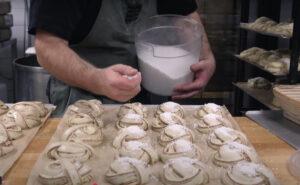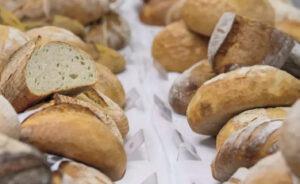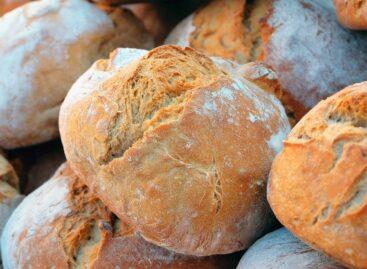Price-sensitive consumers, growing expectations
This article is available for reading in Trade magazin 2025/8-9.

István Mikos
corporate director
Ceres
“The economic difficulties of recent years – cost increases, inflation and changing consumption habits – have posed major challenges for the baking industry. Consumers are more and more conscious, as they have access to lots of information, so it is now important for brands to offer real value and a good price-quality ratio”,
says István Mikos, corporate director of Ceres.
Food products with lower sodium content are increasingly popular among health-conscious consumers and those following special diets.
What the wallet can manage

Miklós Ostermayer
managing director in Hungary
Lantmannen
“We are focusing primarily on our core products and sales channels, increasing production efficiency and cutting other costs, so that we can keep the burden on our customers as low as possible”,
says Miklós Osztermayer, managing director of Lantmannen in Hungary.
Consumers, who have already been price-sensitive, turned even more conscious and cautious in their purchasing decisions, meaning they only buy what they can afford, so premium products and new items are losing ground.

Klára Ludwig
founder and managing director
Jókenyér
Klára Ludwig, founder and managing director of JÓkenyér:
“We have tried to make production more efficient and rationalise the manufacturing of products that sell less”.
The company’s experience is that there are two types of consumers: conscious consumers and those who look for cheaper solutions..

Sponsored illustration
Important promotions

Szilárd Kelemen
commercial director
Fornetti Group
Szilárd Kelemen, commercial director of the Fornetti Group:
“The recent period has reinforced the two pillars of our strategy: flexibility and adaptability. Thanks to our rapid reactions, we keep introducing new products and renewing our classic offerings”.
Seasonal promotions are playing an increasingly important role, with consumers consciously seeking affordable, filling alternatives.

Zoltán Matskási
marketing and
business development
director
Pek-Snack
“The economic difficulties of recent years, have brought about major changes. Manufacturers have often been forced to raise prices, while consumers also reacted: price-sensitivity increased and premium products became less important”,
explains Zoltán Matskási, marketing and business development director of Pek-Snack..
Innovative approaches

Sarkadi Katalin
marketingvezető
Abonett
Katalin Sarkadi, head of marketing at Abonett:
“The prices of our products haven’t augmented compared to other product categories or even traditional baked goods. Abonett products are rich in fibre and contain maximum 3-4 ingredients, offering great value for money”.
The company also uses trendy ingredients such as quinoa, lentils and green peas.
István Mikos says they tailor their product development work to evolving consumer needs. The company pays special attention to developing breads that retain their quality.
Miklós Osztermayer adds that the baking industry is extremely innovative, but it must be borne in mind that large-scale production requires big investment. The company mainly operates in the B2B sector, focusing on the HoReCa channel.
Growing portfolios

Melinda Mórocz
head of marketing
JÓkenyér
Melinda Mórocz, head of marketing at JÓkenyér:
“We listen to feedback from our stores and partners, but we concentrate on innovations that are in line with our vision and quality standards. JÓkenyér also thinks in terms of functionality: increasing plant protein and fibre content”.
Szilárd Kelemen says they continuously analyse customer feedback. Currently the focus is on renewing the mini portfolio, developing new types of dough and fillings, expanding the range of fresh sandwiches nationwide and strengthening the vegan offering.
Zoltán Matskási tells that many see growth potential in discounter chains, but in order to stay close to customers, their franchise network remains important. They have long been more than just a bakery supplier to commercial partners; they think in terms of complete business solutions that create value for customers.
Katalin Sarkadi:
”This year we rolled out the Abonett Food service product line, which provides food companies, kitchens, hotels and restaurants with alternative Abonett products in addition to bread.”
Bread and sugar prices
In recent years the surge in global sugar prices has posed a serious challenge to the baking industry.

The use of innovative methods can be crucial
Bakers are finding themselves in an increasingly difficult position, as sugar isn’t only a flavouring agent, but also an essential structural component of many baked goods. According to data from the World Economic Outlook, the price of baked goods has elevated by 10-25% worldwide. Enzyme technology can be a solution: this allows sugar to be naturally replaced by breaking down the starch in dough.
We bake the bread of the future
An interview with József Septe, president of the Hungarian Bakers’ Association.
– How much bread is consumed annually in Hungary today?

József Septe
president
Hungarian Bakers’ Association
– Bread consumption is declining at a steady rate of approximately 20%, while demand for baked goods has doubled. According to data from the Central Statistical Office (KSH), the total consumption of these two product groups has stabilised, which translates into approximately 50-52kg of bread and baked goods per capita a year.
– What is the reason for the continuous price increase?
– The challenges of recent years – rising global commodity prices, the energy crisis and increasing labour costs – have had a significant impact on the price of bread. By 2024 the price of a kilogram of white bread reached HUF 881 on average.
– How are health trends changing the work of bakeries?
– In response to consumer feedback, bakeries are offering an increasingly wide range of products. The popularity of whole grain, various seeds and rye breads is growing steadily, while products made from spelt, buckwheat, chickpeas and other alternative flours are also gaining ground.
– How does the association help bakeries in their work?
– In 2025 the Hungarian Bakers’ Association isn’t just an interest group for the trade, but also an engine of renewal and innovation. We provide our members with up-to-date market, professional and legal information, regularly organise training courses and study trips abroad, and help them with grant applications and free advice.

Artisanal and small-scale bakeries respond directly to customer needs by developing new recipes
Baked goods waste used
Every year nearly 5 million tonnes of bread go to waste in the EU, representing a financial loss of around EUR 12.5bn. In the spirit of the circular economy, there are more and more examples of how this can be turned into a valuable product. A Belgian brewery uses unsold bread as an ingredient in making beer and then bakes bread again from the by-products of the brewing process. In Poland a company has developed a bread distillate that can be used in cosmetics and soft drinks.

An increasing number of examples show that valuable products can be made from waste
Related news
Pek-Snack: Peach donuts may be popular during Carnival – but Christmas was no longer just dominated by poppy seed bagels
🎧 Hallgasd a cikket: Lejátszás Szünet Folytatás Leállítás Nyelv: Auto…
Read more >XV. St. Stephen’s Day Bread Competition: the Hungarian Bakers’ Association is accepting entries in three categories
🎧 Hallgasd a cikket: Lejátszás Szünet Folytatás Leállítás Nyelv: Auto…
Read more >Related news
Farewell from the president
🎧 Hallgasd a cikket: Lejátszás Szünet Folytatás Leállítás Nyelv: Auto…
Read more >Gastronomic innovations and traditions: 10th Catering Chef Competition at SIRHA
🎧 Hallgasd a cikket: Lejátszás Szünet Folytatás Leállítás Nyelv: Auto…
Read more >(HU) KÖSZ X. Közétkeztetési Szakácsverseny 2025-2026 – Országos döntő
🎧 Hallgasd a cikket: Lejátszás Szünet Folytatás Leállítás Nyelv: Auto…
Read more >








